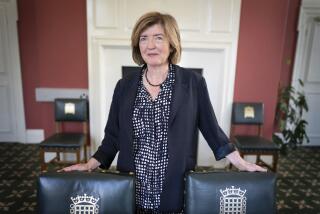Key Aide in Thatcher Cabinet Demoted : Loses Half of His Job in a Reshuffle Affecting Health Service
- Share via
LONDON — Prime Minister Margaret Thatcher reshuffled her Cabinet on Monday, effectively demoting a man once considered her possible successor but leaving other major portfolios untouched.
John Moore, the 50-year-old secretary of state for health and social services and the man responsible for a major overhaul of the country’s creaking National Health Service, lost half his job when Thatcher split his ministry, leaving him in charge solely of the social welfare system.
The 48-year-old junior minister for trade, Kenneth Clarke, was named to head the now-separate Ministry of Health.
The shift follows a series of embarrassing problems with Britain’s health service, coupled with conspicuously inept public performances by Moore in defending government policy.
He had also suffered a bout of pneumonia shortly after his appointment and never seemed to regain his earlier confidence.
Health Service Overhaul
A major overhaul of the health service is currently in progress and is a top priority of Thatcher’s third five-year term.
Just 13 months ago, Thatcher promoted the dynamic Moore to what is considered one of the government’s most politically sensitive jobs amid speculation that she was grooming him as her eventual successor.
Moore’s demotion was one of 23 ministerial jobs changes, many of them non-Cabinet posts.
It marked the 10th reshuffle of Thatcher’s nine-year premiership, and while such changes have become a virtual autumn ritual of the Thatcher years, the timing of Monday’s changes, coming sooner than expected, took the political inner circle in Westminister by surprise.
An aide to Thatcher said the job changes were announced earlier than usual to enable ministers to learn their new jobs during the summer parliamentary recess.
Foreign Trip for Thatcher
Parliament is scheduled to break for the summer Friday, the same day Thatcher departs for a 12-day trip to Oman, Southeast Asia and Australia.
Although Thatcher has differed openly with her chancellor, Nigel Lawson, in recent months on monetary policy and had also clashed with her foreign secretary, Geoffrey Howe, on a similar subject, both retained their jobs.
Monday’s reshuffle is likely to dampen speculation that those two might leave the government.
Among the junior ministers transferred to new jobs was the outspoken Foreign Office minister of state, David Mellor, who moves sideways to a new job in the Department of Health.
Last January, Mellor made a controversial trip to Palestinian refugee camps in the Gaza Strip, where he enraged his Israeli hosts by chastising an Israeli army colonel in front of television cameras over the arrest of a 14-year-old Palestinian and describing conditions in the camps as “an affront to civilized values.”
The major winner in the reshuffle is believed to be Clarke, who comes from the center of Thatcher’s Conservative Party. His appointment as health secretary is expected to result in less radical changes in the health service than the comprehensive overhaul initially contemplated.
Although previously the second-ranking minister in the Department of Trade, Clarke was already a member of Thatcher’s Cabinet, responsible for the government’s inner-cities renewal program.
Antony Newton, a former junior health minister, was given Clarke’s old job and is the only new face in the Cabinet.
More to Read
Sign up for Essential California
The most important California stories and recommendations in your inbox every morning.
You may occasionally receive promotional content from the Los Angeles Times.













